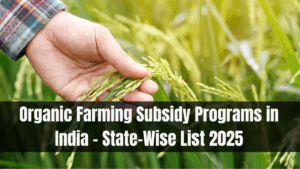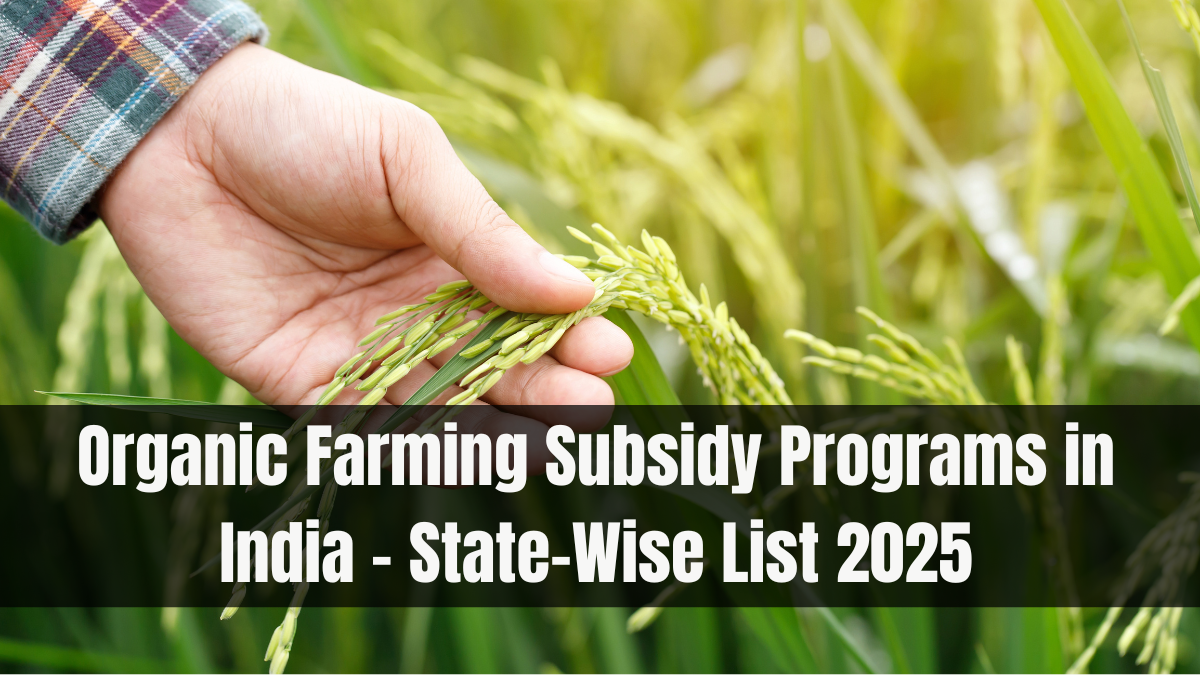With the increasing demand for chemical-free, sustainable food, the Indian government is actively promoting organic agriculture through various organic farming subsidy 2025 schemes. These programs are aimed at helping farmers shift from traditional chemical-based farming to natural methods by providing financial aid, training, and certification support.
As India continues to push for healthier food systems, both central and state governments are rolling out updated subsidy structures in 2025 to encourage more farmers to adopt eco-friendly practices.

Why Organic Farming Matters in 2025
Organic farming not only ensures safe and nutritious food but also helps:
-
Improve soil fertility and water retention
-
Eliminate chemical runoff and pollution
-
Reduce farmer input costs in the long run
-
Provide premium pricing in domestic and export markets
With consumers showing growing awareness of food origin and health, government subsidies are playing a pivotal role in expanding organic acreage across the country.
Central Government Support for Organic Farmers
The Paramparagat Krishi Vikas Yojana (PKVY) remains the flagship scheme under the Ministry of Agriculture. Key features of this central-level subsidy include:
-
Financial assistance of ₹50,000 per hectare for 3 years
-
Support for organic certification, input production, and marketing
-
Cluster-based approach involving 20 farmers over 20 hectares
-
Promotion of organic manure, biofertilizers, and vermicompost units
This scheme is being implemented across all states in collaboration with State Nodal Agencies and NGOs.
State-Wise Organic Farming Subsidy 2025 – Key Highlights
Below is a comprehensive look at major states offering specific subsidies in 2025:
| State | Subsidy Program & Benefits |
|---|---|
| Maharashtra | ₹25,000 per hectare/year for 3 years; support for compost units |
| Uttarakhand | 100% subsidy on vermicompost pits, 75% on biofertilizers |
| Sikkim | State-funded organic mission; training, certification, and logistics |
| Kerala | ₹20,000/acre input subsidy under “Haritha Keralam” |
| Madhya Pradesh | 50% subsidy on organic input kits; training for 10,000 farmers |
| Rajasthan | ₹10 lakh grant for FPOs in organic produce marketing |
| Punjab | Compost units and input subsidy under “Jaivik Kheti Yojana” |
| Himachal Pradesh | ₹2 lakh for cluster formation, organic manure units |
| Tamil Nadu | 50% subsidy on neem cake, bio inputs under “Organic Tamil Nadu” |
These programs include infrastructure grants, input subsidies, and institutional support, varying by region.
How Farmers Can Apply for Subsidies
Farmers interested in benefiting from the organic farming subsidy 2025 should follow these general steps:
-
Visit their State Agriculture Department or nearest Krishi Vigyan Kendra (KVK)
-
Register as an organic farmer or join a certified cluster
-
Submit land ownership documents and Aadhaar ID
-
Get soil tested for organic compatibility
-
Choose from empaneled input suppliers or local cooperatives
Digital platforms like jaivikkheti.in and state portals have also eased the process for registration and monitoring.
Additional Benefits Offered Under the Scheme
-
Organic certification support: NABARD and APEDA offer reimbursement of certification fees
-
Market linkage assistance: Dedicated organic mandis and online marketplaces
-
Training and awareness: Government-funded workshops on pest control, intercropping, and composting
-
Export promotion: States like Sikkim and Kerala are supporting organic exports with packaging and branding support
These steps not only improve farmer income but also promote India as a global organic hub.
Challenges Being Addressed in 2025
The government has introduced reforms to address past issues:
-
Delays in subsidy disbursal – now streamlined via DBT (Direct Benefit Transfer)
-
Limited awareness – more KVKs offering localized training
-
Market access – better logistics and dedicated organic marketing cells
-
Cost burden – higher support for initial transition phase from chemical to organic
With these enhancements, more farmers are now willing to shift toward sustainable cultivation.
FAQs
What is the eligibility for organic farming subsidy 2025?
Farmers with cultivable land, Aadhaar-linked bank accounts, and willingness to follow organic standards can apply under PKVY or state schemes.
Are subsidies available for composting units?
Yes, most states offer 50%–100% subsidy for setting up vermicompost and organic manure units.
Is certification necessary to receive the subsidy?
Yes, certification from a recognized agency (like NPOP or PGS) is often mandatory, but the cost is subsidized under most schemes.
Can I get subsidy for organic farming as an FPO?
Yes, Farmer Producer Organizations (FPOs) receive higher financial support for infrastructure and marketing.
Where can I check available subsidies in my state?
Visit your State Agriculture Department website or consult your nearest KVK or Block Agriculture Office for current details.
